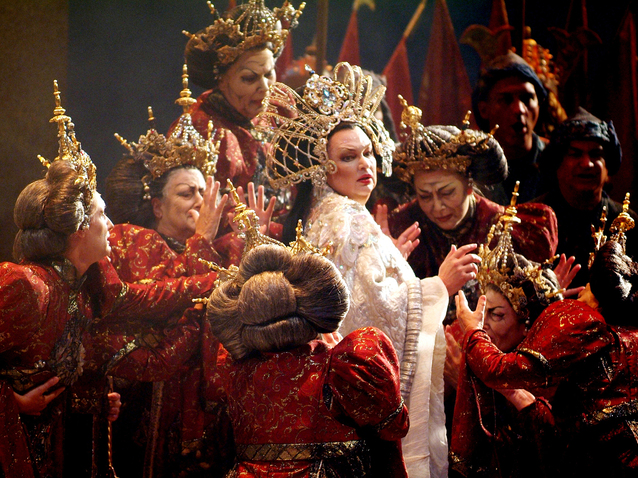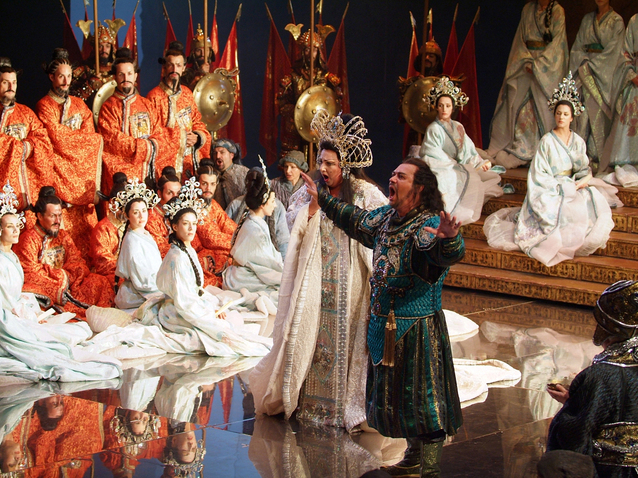 © Gran Teatre del Liceu
© Gran Teatre del Liceu
For an opera production, 25 years is an almost venerable age. Few manage to reach it. On the eve of the year in which the centenary of Puccini's death will be commemorated on the one hand, and on the other, the 25th anniversary of the reopening of the theatre after the fire that destroyed it in 1994, the Liceu has once again revived the production of Turandot with which it reopened in 1999 and which had already been remade in 2005 and 2009.
Ezio Frigerio (deceased in 2022) designed for this Turandot a luxurious, monumental, spectacular and eye-catching set design that with its showiness reminds us of a clichéd and ‘theme park-like’ ancient China. The original stage direction of the production was the work of the actress and director Núria Espert, the restaging of Espert's work has been entrusted to her granddaughter, Bárbara Lluch, who has respected her grandmother's work overall but has introduced a significant change: Espert, based on a feminist interpretation of the play, had Turandot commit suicide at the end so that she would not have to give herself to the man who had defeated her, while Bárbara Lluch has the play end with the traditional happy ending envisaged by the authors, according to which the "Ice Princess" ends up falling in love with the daring Calaf.
From a dramatic point of view, the production is rather conventional and does not provide a new vision of this strange and barbaric story that fascinated Puccini, a story full of cruelty and blood that, distanced in time and space, allowed the composer to abandon the bourgeois morality and the more or less veristic realism he had practised in previous works and enter a suggestive sphere of transcendence with unreal, implausible characters who, beyond good and evil, move in the realm of myth.

Turandot, Gran Teatre del Liceu 2023
Musically, the opening night was of a generally good standard. Elena Pankratova has the dramatic soprano voice required for the character of Turandot, and with impressive volume and vocal projection, she navigated very well all the enormous difficulties of her score. Scenically she was comfortable in a stage direction that made her always move like a living statue.
Michael Fabiano, with a beautiful, well-toned voice, very good projection and an easy, luminous treble, fully convinced the audience in the role of Calaf. Fabiano started well and finished magnificently, placing the dangerous B natural that crowns "Nessun dorma" without difficulty and, as the score indicates, he did not prolong it unnecessarily as so many tenors eager to show off their powers do.
The very human Liù, the counter-figure of Turandot, the most touching female character Puccini created, the only flesh and blood character in the whole work, the woman who fell in love with a smile and who will live in silence her impossible love and die to protect it, was played by the French soprano, newcomer at the Liceu, Vannina Santoni. The singer went through "Signore, ascolta" correctly but without excellence, but she gained confidence as the work progressed and gave a very good interpretation of "Tu che di gel sei cinta", her most eagerly awaited performance.
The trio of Ping, Pang and Pong, characters who seem to have escaped from the Commedia dell'arte, present many more musical difficulties than would be appropriate for dramatically secondary characters; there are no high demands in terms of registers, but they are always involved in complex concertante passages that are not easy to resolve. Manel Esteve, Moisés Marín and Antoni Lliteres gave an overall good interpretation of Ping, Pang and Pong.

Turandot, Gran Teatre del Liceu 2023
The bass Marko Mimica played a solid Timur with a strong and confident voice. It is a tradition to give the character of the Emperor Altoum to a prestigious singer in the final phase of his career. The theatre made a mistake by having Siegfried Jerusalem play the role. The great tenor Siegfried Jerusalem was in no way fit to sing. It was very sad.
Turandot is one of the great repertoire works with the greatest choral participation. The Liceu Choir and the Children's Choir of the Orfeó Català gave a very good performance overall, with some minor and occasional mismatches. In some parts sung off-stage, the sound of the choir was not loud enough to reach the hall.
For the musical direction, the Liceu turned to the Mexican conductor Alondra de la Parra, who was making her debut at the theatre. Conducting Turandot is not easy, the orchestration is dense and complex, there are many concertante sections with soloists and chorus that are not easy to bring together, and rhythmically it presents many difficulties. Alondra de la Parra, who already has a notable career as an orchestra conductor but little experience as an opera conductor, handled the task of conducting Turandot very well.
Puccini is not on the list of avant-garde composers of the 20th century, but the work dates from 1924 and cannot be conducted as if it were La Bohème; De la Parra understood this perfectly and brought out the score's surprisingly "modern" timbral colouring and the harmonic daring it offers. She balanced voices well with orchestra, she knew how to obtain from the orchestral ensemble the majestic and epic sound at the end of the act, but she also knew how to give Liù tenderness and sonorous intimacy.
The scenic monumentality and the high musical level ensured that the good old Turandot of 25 years ago triumphed once again at the Liceu.
Xavier Pujol
Barcelona, 26th November 2023
Turandot by Giacomo Puccini. Elena Pankratova, soprano. Siegfried Jerusalem, tenor. Marko Mimica, bass. Michael Fabiano, tenor. Vannina Santoni, soprano. Manel Esteve, baritone. Moisés Marín, tenor. Antoni Lliteres, tenor. David Lagares, bass-baritone. Orchestra and Choir of Gran Teatre del Liceu. Children’s Choir of Orfeó Català. Alondra de la Parra, conductor.Núria Espert, stage director. Bárbara Lluch, remake. Ezio Frigerio, scenography. Franca Squarciapino, costumes.Vinicio Cheli, lighting. Co-production by Gran Teatre del Liceu and Asociación Bilbaína de Amigos de la Ópera (ABAO). Gran Teatre del Liceu.
the 29 of November, 2023 | Print
Comments